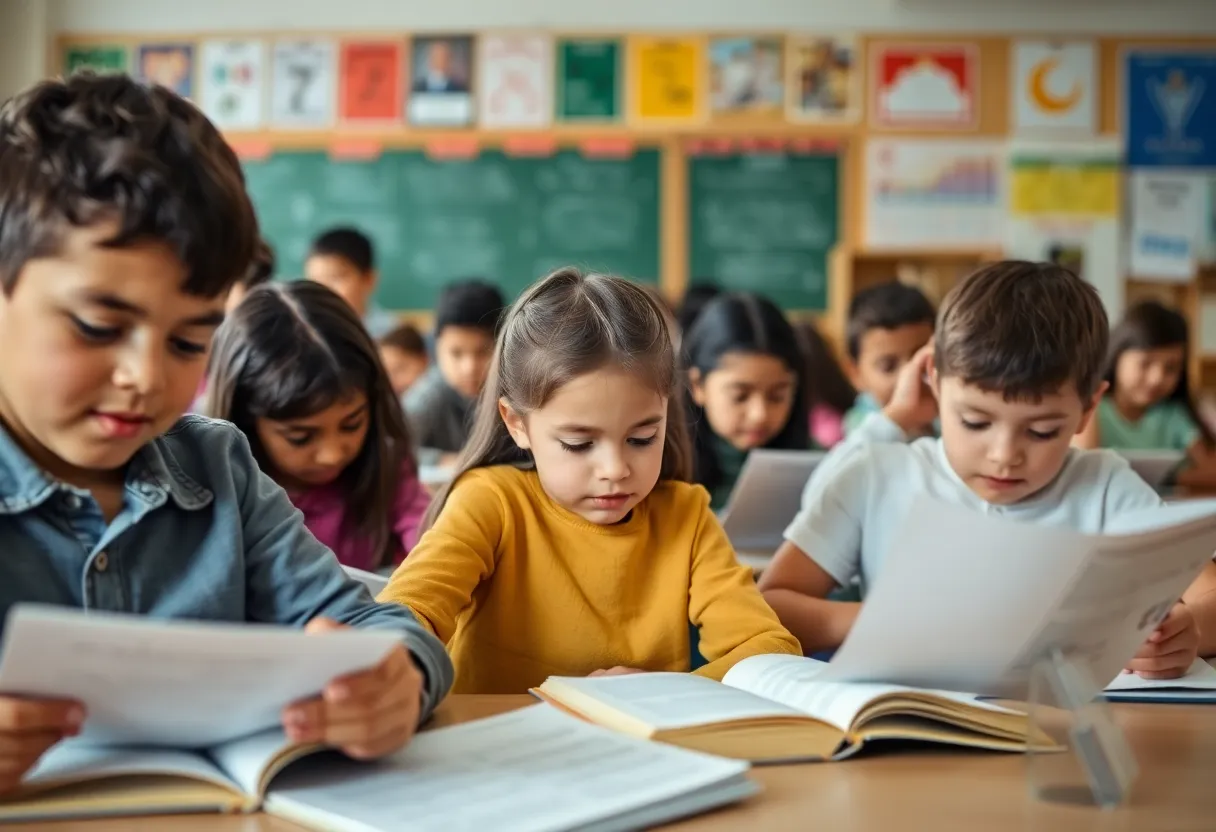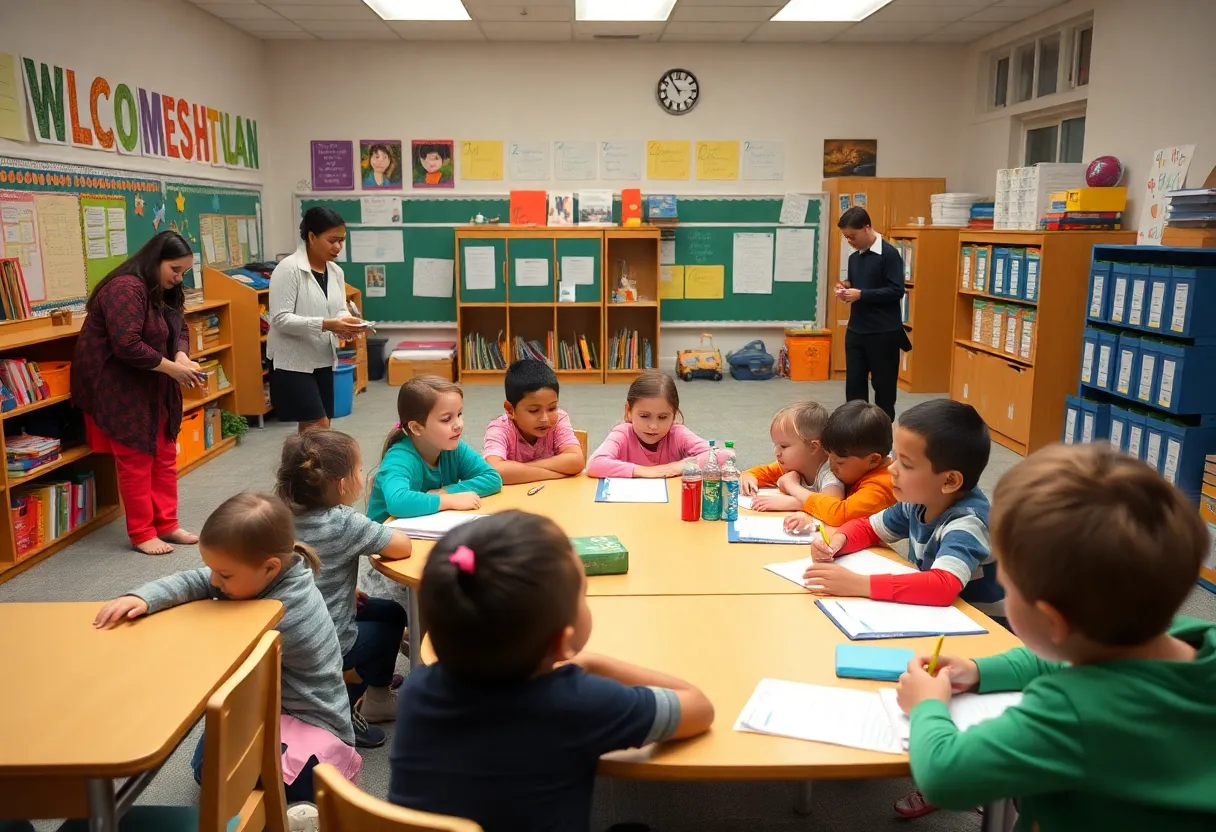News Summary
Recent findings from the National Assessment of Education Progress reveal that high school students in the US are facing a worrying decline in reading and math scores. For the first time since the COVID-19 pandemic, the latest assessment shows that scores for 12th graders have hit their lowest levels in over 20 years. With a growing percentage of students failing to meet basic proficiency standards, education experts are calling for comprehensive strategies to address these educational challenges and ensure better student outcomes.
Washington, D.C. — Decade-Long Decline in Student Performance Continues as High School Reading and Math Scores Hit Historic Lows
Recent data from the National Assessment of Education Progress (NAEP) reveals that high school students in the United States continue to experience a significant decline in academic performance, marking a concerning decade-long trend. The latest assessment, released on Tuesday, indicates that 12th graders’ scores in reading and math have plummeted to their lowest levels in over 20 years. This decline is part of a consistent downward trend observed over multiple NAEP releases.
Key Findings from the Latest NAEP Data
The 2024 results show that average reading scores for 12th graders are the lowest since the NAEP’s inception in 1992, highlighting a persistent decline in literacy skills among high school seniors. In math, a similar pattern emerges, with only 33% of high school seniors deemed prepared for college-level work, a decrease from 37% in 2019. Conversely, more students are failing to meet basic achievement standards, with approximately 45% scoring below the basic proficiency level in math and 32% in reading.
Furthermore, these assessments marked the first since the COVID-19 pandemic to evaluate reading and math abilities of 12th graders, as well as science for 8th graders. The pandemic’s disruption to regular schooling appears to have compounded ongoing educational challenges, with schools reporting difficulties in providing hands-on learning experiences needed for effective science education during the pandemic period.
Declines Across Subjects and Grade Levels
In addition to core literacy and numeracy skills, eighth-grade students also experienced significant setbacks, particularly in science skills. Data indicate that fewer students are engaging in inquiry-based learning activities, which are critical for understanding scientific principles. This decline correlates with broader issues in science education, including less frequent reading of scientific texts and reduced hands-on experiments.
Recent Trends and Historical Context
The latest NAEP results underscore that the performance gap among different student groups continues to widen. The largest disparities are evident in eighth-grade science and twelfth-grade math. Additionally, a gender gap has re-emerged, with girls experiencing a sharper decline in scores since 2019 in science and math assessments.
Experts point to multiple contributing factors beyond the pandemic itself. These include increased screen time, shortened attention spans, and an educational shift toward shorter texts. Notably, the amount of reading assigned in high school has decreased considerably, with some classes now assigning only three books annually compared to approximately 20 books two decades ago.
Impacts on Student Achievement and Education Policy
The data reveal that more students are scoring below basic achievement levels. Specifically, 32% of high school seniors scored below basic proficiency in reading, and a record-high 45% fell below this threshold in math. This raises concerns about students’ preparedness for college and the workforce.
Education policymakers continue to debate the best approaches to address these declines. Education Secretary Linda McMahon emphasized the importance of giving states greater control over education spending to tackle the achievement gaps effectively. In contrast, some legislative voices argue that dismantling federal oversight, such as the Education Department, could worsen existing inequities and hinder improvements in student outcomes.
Broader Context and Underlying Factors
Analysis indicates that the performance downturn began prior to the pandemic, suggesting other underlying issues. These include decreasing engagement in inquiry-based science activities, reduced reading volumes, and challenges faced during remote learning periods. Many schools reported difficulty in providing adequate hands-on and experiential learning opportunities during the pandemic, which may have long-term impacts on student understanding and skills development.
The assessment data, collected from January to March 2024, paints a concerning picture of the state of education in the country. Experts warn that addressing these persistent declines will require multi-faceted strategies that extend beyond temporary measures, focusing instead on improving curriculum quality, increasing reading and science engagement, and restoring equitable access to quality education resources.
The results serve as a critical indicator that ongoing efforts to improve student achievement need reassessment and reinforcement, especially as the nation grapples with the long-term impacts of recent disruptions to education systems nationwide.
Deeper Dive: News & Info About This Topic
HERE Resources
School Board Considers Closures Amid Financial Difficulties
D.C. Students Face New Challenges as School Year Begins
Hamilton County Schools Cancel Football Game Over Safety Issues
Leander ISD Faces Community Backlash Over School Closures
Texas A&M University Invests in Campus Infrastructure with Tuition Freeze
Tensions Escalate in D.C. Amid School Year Opening
Food Bank of Iowa Launches School Programs to Combat Hunger
Philadelphia School Board Discusses Transportation Cuts and Charter School Closures
Knox County Schools Achieve High Academic Rankings
Chicago Schools and Illinois Improve in National High School Rankings
Additional Resources
- KION546: Best Public Middle Schools in California
- Wikipedia: Education in the United States
- California Local: How California Measures School and Student Success
- Google Search: Educational success in California
- Newsweek: San Francisco Public Schools’ Equity Homework
- Encyclopedia Britannica: Education
- Fox News: San Francisco School District Ditches Grading Equity Program
- Google Scholar: Grading equity programs
- Mountain Enterprise: STAR Testing Results for El Tejon Unified School District
- Google News: Decline in education performance
- National Review: San Francisco High Schools’ Equity Grading Program
- CBS News: San Francisco Grading for Equity Backlash
Author: STAFF HERE WASHINGTON DC
The WASHINGTON DC STAFF WRITER represents the experienced team at HEREWashingtonDC.com, your go-to source for actionable local news and information in Washington, DC, and beyond. Specializing in "news you can use," we cover essential topics like product reviews for personal and business needs, local business directories, politics, real estate trends, neighborhood insights, and regional news affecting the area—with deep expertise drawn from years of dedicated reporting and strong community input, including local press releases and business updates. We deliver top reporting on high-value events such as the National Cherry Blossom Festival, Kennedy Center Honors, and the Washington Auto Show. Our coverage extends to key organizations like the Greater Washington Board of Trade and Destination DC, plus leading businesses in government contracting and technology that power the local economy such as Lockheed Martin and Amazon. As part of the broader HERE network, we provide comprehensive, credible insights into the dynamic landscape of the Washington metropolitan area.




